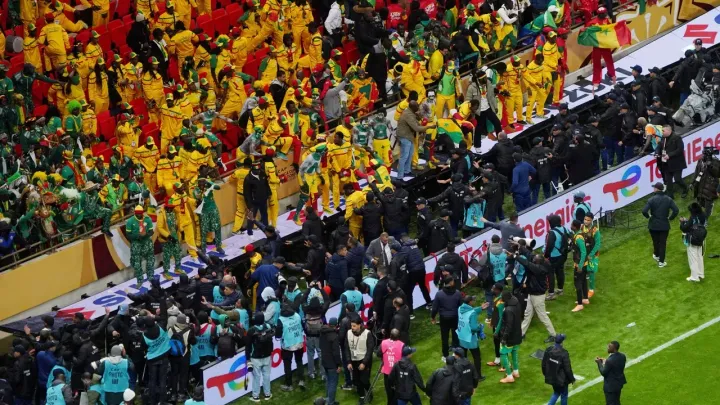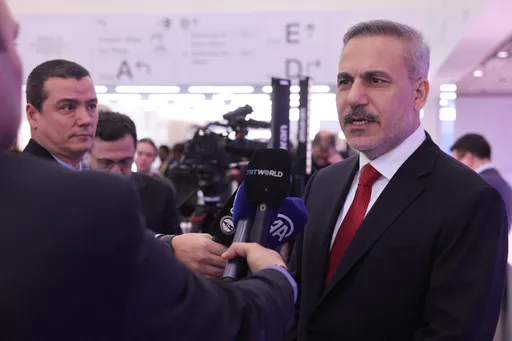Momodou Taal, a PhD student of Gambian British origin at Cornell University, would seethe with impotent rage at the thought of the horrors unfolding in Gaza.
Nearly 70,000 deaths, a city flattened to the ground, and millions starving – Taal's daily feed of heartbreaking images documenting the genocide perpetrated by Israel in the name of fighting Hamas shook his conscience.
Then, one day, the dam burst. Taal decided he must act rather than be just another passive observer. He joined a protest on campus demanding an end to the war.
"Palestine holds up a mirror to the world and asks, 'What type of world do we want to live in'?" the young student tells TRT Afrika.
As Taal and millions of others like him worldwide seek to answer that question by showing solidarity with suffering Palestinians, some of them – especially in the US – have had to face unexpected consequences.
The Donald Trump administraion revoked at least 300 foreign student visas, primarily targeting those at the vanguard of the pro-Palestinian protests sweeping through American universities.
Turkish national Rumeysa Ozturk was among them. Mahmoud Khalil, who holds a green card, was detained in Louisiana, while Taal was ordered to surrender to immigration authorities shortly after he filed a lawsuit challenging the visa revocations.
He sees the protests against Israel on US campuses as a watershed moment, comparable to Black Lives Matter.
"We are seeing this (war in Gaza) as another instantiation of heightened consciousness. We are understanding what anti-imperialism means, what settler colonisation is, and how US hegemony works. We are challenging this within the belly of the beast," says Taal, who has since left the US.
Colonial echoes
At the recent UN General Assembly, Taal's sentiments found an echo in the speeches of African leaders as each of them linked the Palestinian cause to their respective countries' history of fighting western imperialism.
President Netumbo Nandi-Ndaitwah of Namibia put things in perspective, reminding everyone that her country experienced the first genocide of the 20th century. She warned that failure to address the Palestinian crisis would be an extension of that historical injustice.
According to Taal, modern international order treats black, indigenous, brown and Muslim people "as the other, as the enemy, and a group upon whom force is allowed".
He points out that Israel's language against Palestinians reflects a tone prevalent across centuries. "If you were to remove the person speaking, you would think you are picking up a 16th-century colonial manual."
Many historians see settler colonialism as ethnic cleansing wrapped in ideology. While Israel frames its actions as self-defence, they see the relentless pounding of Palestine as a primeval act of aggression without moral grounding.
Partitioning Palestine
Modern-day Palestine belonged to the Ottoman Empire until a little over a century ago. When the empire collapsed during World War I, Britain seized control.
In 1917, the then British foreign secretary, Arthur James Balfour, proclaimed support for a "national home for the Jewish people" in Palestine.
Taal quotes Columbia University's Joseph Massad, professor of modern Arab politics and intellectual history, to illustrate how "Palestine has the unfortunate experience of being the first and the last British colony".
The British government's Balfour Declaration paved the way for a Jewish state in the Middle East and extended international legitimacy to what would become Israel.
The Holocaust became one of the triggers for mass Jewish migration to Palestine, escaping the massacre in Europe in the 1940s under the then Nazi regime.
After WWII, the UN General Assembly voted on November 29, 1947, to partition Palestine between Arabs and Jews. Israel's establishment followed.
"The walkout of the Arab delegates was taken as a clear indication that the Palestinian Arabs would have nothing to do with the Assembly's decision," the New York Times reported at the time.
Israel's ministry of foreign affairs mentions that "on May 14, 1948, on the day in which the British Mandate over Palestine expired, the Jewish People's Council declared the establishment of the state of Israel". The US recognised the newly created state that very night.
Israel's founding led to a full-blown war with neighbouring Arab states, one from which the new state emerged victorious, claiming more territory than the UN had allocated.
Palestinians call it "al Naqba", meaning "the catastrophe". Around 700,000 Palestinians were consequently displaced back then.
October 7 debate
For Palestinians, 77 years of Israeli occupation and oppression have sparked multiple uprisings and resistance.
"We should be reminded that history does not start on October 7. The conditions that triggered violence that day began way before that," argues Taal.
Not everyone accepts this framing. Ashriel Moore, a spokesperson for the Black Hebrew community in Israel, insists there were "provocations from both ends in the past".
He traces the current devastation directly to Hamas's October 7 ambush on Israel, noting that members of Israel's Black community living near the Gaza border in Ashkelon and Netivot have since been forced out of their homes.
"We have been as much a target as anybody else. Missiles launched towards Dimona have caused our community to remain in constant panic, rushing to shelters three-four times a night," explains Moore.
As leaders search for an elusive political settlement to end the war in Gaza, Moore proposes something radical and rooted more in humanitarian ethos than geopolitical logic.
"What we should seek is a spiritual solution based on the fundamental principles and attributes of God – love, compassion, truth and peace," he tells TRT Afrika.
























